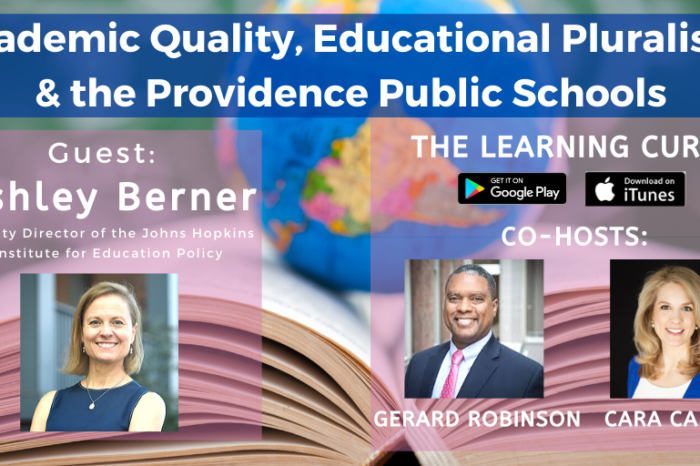Ashley Berner of Johns Hopkins on Academic Quality, Educational Pluralism, & the Providence Public Schools
This week on “The Learning Curve,” Cara and Gerard continue coverage of COVID-19’s impact on K-12 education, joined by Ashley Berner, Deputy Director of the Johns Hopkins Institute for Education Policy. Ashley discusses what America can learn from other countries about how to shift from a uniform system in which district schools focus on workforce skills, to one that embraces a liberal arts curriculum delivered by many different models to advance excellence and equity, and close achievement gaps. She reviews which districts and states are incentivizing the use of robust curricula, assessment, and teacher preparation, with successful outcomes, and discusses her team’s alarming report that made national headlines last year on the Providence, R.I. public school system. They also talk about the new NAEP results for history, geography, and civics; the Founding Fathers’ view of the liberal arts’ centrality to democratic citizenship; and how to reverse troubling knowledge gaps. Lastly, they explore what COVID-19 is teaching us about our nation’s readiness, relative to other countries, for the transition to remote learning, and socioeconomic inequities.
Stories of the Week: In Oklahoma, Gov. Kevin Stitt received criticism from the state’s schools superintendent and teacher union this week for announcing plans to use some federal CARES Act relief funds to support a tax credit program for scholarships that help low-income children attend private schools. In Utah, where only 40 percent of Navajo families have Internet access, schools are working to provide wireless hot spots for about 200 homes. Are issues with Wi-Fi access revealed by the COVID-19 crisis transforming the way we think about equity and states’ duty to educate all children?
The next episode will air on May 1st, 2020 with guest, John M. Barry, author of the New York Times best seller, The Great Influenza: The Story of the Deadliest Pandemic in History.
Newsmaker Interview Guest:
 Ashley Berner is Deputy Director of the Johns Hopkins Institute for Education Policy and an Associate Professor at the Johns Hopkins School Education. She served previously as the Deputy Director of the CUNY Institute for Education Policy and the Director of the Education Program at the Institute for Advanced Studies in Culture, UVA. Dr. Berner has published articles and book chapters on the relationship between educational structure and state funding in democratic nations, religious education and citizenship formation, and teacher preparation in different national contexts. Palgrave MacMillan published her book Pluralism and American Public Education: No One Way to School in 2017. She holds degrees from Davidson College (Honors A.B.) and from Oxford University (M.Litt. and D.Phil. in Modern History).
Ashley Berner is Deputy Director of the Johns Hopkins Institute for Education Policy and an Associate Professor at the Johns Hopkins School Education. She served previously as the Deputy Director of the CUNY Institute for Education Policy and the Director of the Education Program at the Institute for Advanced Studies in Culture, UVA. Dr. Berner has published articles and book chapters on the relationship between educational structure and state funding in democratic nations, religious education and citizenship formation, and teacher preparation in different national contexts. Palgrave MacMillan published her book Pluralism and American Public Education: No One Way to School in 2017. She holds degrees from Davidson College (Honors A.B.) and from Oxford University (M.Litt. and D.Phil. in Modern History).
Tweet of the Week:
Although Patriots’ Day 2020 will be different given uncertain times, no marathon or morning baseball game, the importance and significance of the day remains as strong as ever. #WeAreMV #AmericanHeritage pic.twitter.com/8F59IR0h0v
— Mystic Valley Regional Charter School (@mysticvalleyrcs) April 20, 2020
News Links:
The Oklahoman: Coronavirus in Oklahoma: Hofmeister, OEA ‘do not support’ federal aid to private schools
NPR: Navajo Families Without Internet Struggle To Home-School During COVID-19 Pandemic





















